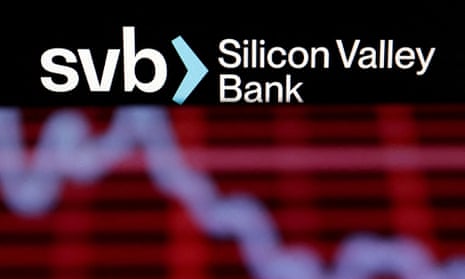Introduction: Markets to rally despite financial stability fears
Good morning, and welcome to our rolling coverage of business, the financial markets and the world economy.
Risks to financial stability have increased, with the uncertainties in the world economy remained “exceptionally high”, the head of the International Monetary Fund has warned.
Speaking at a conference in Beijing last weekend, Kristalina Georgieva urged vigilance following the recent banking sector turmoil in advanced economies.
Georgieva cited the events in the banking sector, telling the annual China Development Forum that:
“At a time of higher debt levels, the rapid transition from a prolonged period of low interest rates to much higher rates – necessary to fight inflation – inevitably generates stresses and vulnerabilities, as evidenced by recent developments in the banking sector in some advanced economies.
Her comments came after several volatile weeks in the financial sector, which saw the failure of Silicon Valley Bank and the rescue of Credit Suisse by UBS.
Georgieva noted that policymakers have acting decisively, adding:
“These actions have eased market stresses to some extent but uncertainty is high and that underscores the need for vigilance.”
Banking sector jitters spread to Deutsche Bank last week, when shares in the German bank slipped and the cost of insuring its debt rose.
But, the selloff seemed to be triggered by a lack of confidence, rather than a specific problem at Deutsche.
Ipek Ozkardeskaya, senior analyst at Swissquote Bank, says:
Despite the bank stress on both sides of the Atlantic, both, the Federal Reserve (Fed), the European Central Bank (ECB), the Bank of England (BoE) and the Swiss National Bank (SNB) haven’t refrained from hiking the interest rates over the past two weeks, weighing – not necessarily on the health of the banks’ balance sheets, but on worries regarding the health of the banks’ balance sheets.
Today, it appears that the banking crisis is more of a confidence crisis than a fact-based panic – as it was the case in 2007 when banks really had a bunch of toxic assets in their balance sheets.
But confidence is the bread and butter of the banking sector. And watching the 166-year-old Credit Suisse go under did no good to anyone last Monday.
But the markets do look calmer this morning, with the main European indices being called up almost 1% in pre-market trading.
The agenda
-
9am BST: Ifo index of Germany’s business climate for March
-
1aam BST: CBI distributive trades survey of UK retail for March
-
3.30pm BST: The Dallas Fed manufacturing index for March
-
6pm BST: Bank of England governor Andrew Bailey speaks at the LSE
Key events
IG: Steady drain of deposits from banks creates a slow motion problem
Markets have opened calmly this morning, and it looks like Friday’s panic over Deutsche Bank was a bit misplaced, says Chris Beauchamp, chief market analyst at IG Group.
But, he warns that a ‘slow motion’ problem is building:
The steady drain of deposits from banks means a slow motion problem is in the making, and could result in a contraction in lending that brings on a recession.
This is the bigger risk than the hunt last week for the next domino to fall in the global banking system.
Data overnight has shown that profits at industrial firms in China have tumbled in the first two months of the year, as factories struggle to recover from the Covid-induced slump.
Industrial profits fell by 22.9% in January and February, compared with a year ago.
nalysts blamed lacklustre demand and persistent high costs, as the world’s second-largest economy struggled to emerge from its long lockdown.
First Citizens to buy failed Silicon Valley Bank

Silicon Valley Bank, the regional lender whose collapse sparked the banking crisis this month, is being largely acquired by First Citizens Bank.
First Citizens Bank is buying Silicon Valley Bank’s loans and deposits from the Federal Deposit Insurance Corporation (FDIC) and will operate its 17 branches, US regulators announced today.
They estimate the lender’s collapse would lead to $20bn (£16.3bn) of losses for a deposit insurance fund paid for by banks.
Victoria Scholar, head of investment at interactive investor, explains:
Around $119 billion of SVB’s deposits and $72 billion of assets will be taken on by First Citizens Bank while $90 billion of assets will remain with the FDIC, costing the insurance fund around $20 billion. First Citizens has a history of acquiring embattled lenders in FDIC supported deals.
SVB’s losses on its bond portfolio losses and the acceleration of customer withdrawals prompted jitters across the sector. Since its collapse on 10th March, the banking sector has been under pressure, exacerbated by the turmoil at Credit Suisse which was salvaged in a rescue deal from UBS. This has sparked contagion fears with shares in Deutsche Bank tumbling as much as 14% at one stage during Friday’s session amid nervousness about its exposure to commercial property and derivatives, sending the cost of insuring against its bonds sharply higher.
The placatory deal for SVB has helped to calm market skittishness after the recent sthenic price action, Scholar adds:
Banks are outperforming at the European open with Deutsche Bank up by more than 6.5% and Credit Suisse up by over 2.5%. Commerzbank, Société General and BNP Paribas are also bouncing on Monday.
Asia-Pacific markets were calmer today, with Japan’s Nikkei gaining 0.33%, Australia’s S&P/ASX flat, but Hong Kong’s Hang Seng down 0.9%.
“So far, it’s been comparatively calm in markets to start the week,” reports Stephen Innes, managing partner at SPI Asset Management.
As Innes explains, some banks have been caught out by the fall in bond prices, which means they face taking a loss if they have to sell those bonds due to customer withdrawals (as occured with Silicon Valley Bank):
Investors better understand the problems facing American banks today are not remotely similar to the subprime mortgage crisis when underwater borrowers defaulted on loans en masse.
Instead, banks are warehousing long-duration high-quality paper but fund the book at higher short-term rates; hence they are bleeding profits on mismatched interest rate positions.
UK banks open higher
European stock markets have shaken off last week’s worries, rallying at the start of trading.
The UK’s FTSE 100 index has jumped by 79 points, or 1%, to 7485, recovering most of Friday’s losses.
Bank shares are among the leading risers, with Barclays rallying 3.5%, Standard Chartered gaining 2% and NatWest and Lloyds Banking Group both up 1.8%.
Across the channel, France’s CAC 40 is up 1.3%, while Spain’s IBEX is up 1.4% and Germany’s DAX is up 1.3%.
Saudi National Bank chair resigns after Credit Suisse comments
Newsflash: the chair of Saudi National Bank has resigned, just days after helping to spark a slump in the Swiss lender’s shares.
Ammar Al Khudairy, the chairman of Credit Suisse’s largest shareholder, is stepping down “for personal reasons”, SNB said this morning.
He will be replaced by chief executive officer Saeed Mohammed Al Ghamdi
Al Khudairy hit the headlines this month, when he revealed that SNB, which owns a near-10% share of Credit Suisse, would not increase its stake.
Those comments appeared to send the Swiss bank’s shares tumbling, leading to its forced merger by UBS a few days later.
Saudi National Bank confirmed to CNBC last week that it had been hit with a loss of around 80% on its investment in Credit Suisse.
Deutsche Bank is expect to recover some of Friday’s losses today.
Deutsche Bank’s shares are up 4.2% in pre-market trading, after ending last week sharply lower.
Seems oddly calm this morning, but looking back it does seem like last week’s panic over Deutsche Bank was a bit overdone…
— Chris Beauchamp (@ChrisB_IG) March 27, 2023
Analysts did struggle to explain last Friday’s selloff, with Citigroup suggesting it may be down to an “irrational market.”
Introduction: Markets to rally despite financial stability fears

Good morning, and welcome to our rolling coverage of business, the financial markets and the world economy.
Risks to financial stability have increased, with the uncertainties in the world economy remained “exceptionally high”, the head of the International Monetary Fund has warned.
Speaking at a conference in Beijing last weekend, Kristalina Georgieva urged vigilance following the recent banking sector turmoil in advanced economies.
Georgieva cited the events in the banking sector, telling the annual China Development Forum that:
“At a time of higher debt levels, the rapid transition from a prolonged period of low interest rates to much higher rates – necessary to fight inflation – inevitably generates stresses and vulnerabilities, as evidenced by recent developments in the banking sector in some advanced economies.
Her comments came after several volatile weeks in the financial sector, which saw the failure of Silicon Valley Bank and the rescue of Credit Suisse by UBS.
Georgieva noted that policymakers have acting decisively, adding:
“These actions have eased market stresses to some extent but uncertainty is high and that underscores the need for vigilance.”
Banking sector jitters spread to Deutsche Bank last week, when shares in the German bank slipped and the cost of insuring its debt rose.
But, the selloff seemed to be triggered by a lack of confidence, rather than a specific problem at Deutsche.
Ipek Ozkardeskaya, senior analyst at Swissquote Bank, says:
Despite the bank stress on both sides of the Atlantic, both, the Federal Reserve (Fed), the European Central Bank (ECB), the Bank of England (BoE) and the Swiss National Bank (SNB) haven’t refrained from hiking the interest rates over the past two weeks, weighing – not necessarily on the health of the banks’ balance sheets, but on worries regarding the health of the banks’ balance sheets.
Today, it appears that the banking crisis is more of a confidence crisis than a fact-based panic – as it was the case in 2007 when banks really had a bunch of toxic assets in their balance sheets.
But confidence is the bread and butter of the banking sector. And watching the 166-year-old Credit Suisse go under did no good to anyone last Monday.
But the markets do look calmer this morning, with the main European indices being called up almost 1% in pre-market trading.
The agenda
-
9am BST: Ifo index of Germany’s business climate for March
-
1aam BST: CBI distributive trades survey of UK retail for March
-
3.30pm BST: The Dallas Fed manufacturing index for March
-
6pm BST: Bank of England governor Andrew Bailey speaks at the LSE

